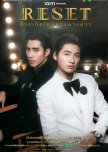
This review may contain spoilers
The show is a vehicle for Earth & Mix - nothing more.
I’ve never written a review before seeing all the episodes but with this one I can’t predict how long I’ll hold out so here’s a brief review so far.After the dramatic realism of “A Tale of Thousand Stars”, “Cupid’s Last Wish” is the polar opposite: a fantasy-comedy that is a vehicle for the popular coupling of Earth & Mix. Production values are good and the two stars are enthusiastic but the story is a dud and the first episode is a shocker. Mix’s character’s behaviour is so repellent only fans will want to keep watching. The plot jumps erratically from one extreme event to another and descends into farce. A car accident produces a head injury which the hospital resident ignores to allow the patient to leave within 24hours. A shaman appears and issues instructions which obliges the two leads to commence a road trip. So far, the show feels like it was put together by a committee working off the “Best of BL plots” list.
Was this review helpful to you?

This review may contain spoilers
A first class example of the BL genre within the Chinese history costume drama category.
The sad, fateful unhappy endings of so many early gay films or series, which once upon a time seemed almost to be a requirement, that gay people do not deserve long, happy lives, makes a grand re-appearance in “Kill To Love” but in a manner that works and makes sense for the characters and the historic times they lived.This Singaporean effort at a sweeping Chinese costume drama of rival princes and hostile neighbouring kingdoms in medieval China, within its limited budget, does well despite lacking the forces of extras in palace scenes or battle enactments that Chinese productions gloriate in. The key to this compensation is the casting: all of the principal actors inhabit their characters with conviction, and the two main leads with especial impact.
The lack of information in the notoriously difficult production environment of Chinese language BLs, created by Chinese creatives, starkly contrasts with the abundance of intermingling story lines, character interactions, and plot developments. While the novel on which the series is based has been described as both a buxia (martial arts) and a danmei (bl), the resulting drama, while compelling in its unfolding, resides ultimately in its own category, unique to Chinese storytelling.
It is equally admirable and intimidating that Chinese storytelling should be able to envelop so many prominent themes into an individual story.
Familiar to each other as young boys, the two main characters, Shu He and Si Ang, meet again by chance at a critical juncture in the history of their kingdoms (Nan Hui Kingdom and Ji Bei Kingdom). Their attraction to each other has to play out against the political forces and characters of their time; in the end, this environment, beyond their control, shapes their destiny. This may give the appearance of lives determined by fate, but the fascination behind “Kill To Love” (an awful title compared to the novel’s “The Mountains and Rivers Are Forever Silent”) is that it is in the characters of Shu He and Si Ang where the core emotional conflict and passion emerge, combust and consume.
In the first episode, we meet all the main players, and, in addition, the director and writer cleverly combine two different scenes of injury. Si Ang, who has been surprised in his assassination attempt of the Crown Prince, receives an arrow wound to his shoulder as he flees; immediately following, the young Crimson Shadow Guardsman Huo Ying is seen visibly distressed and in pain.
One would’ve thought that the young aspirants for admission into the Crimson Shadow Guard would have noticed something amiss about a military guard in which the members experienced ten years of poisoning, from which their loyalty was secured by receiving, as part of their pay package, so to speak, regular antidotes. But that’s not really the point (even though it very much plays into the action). Just as it's speculated that the poison is administered internally to the Guard members in their diet, the defining force in this drama - the need to love and be loved - is inside of Shu He and Si Ang, and can not be extinguished.
At their first meeting in this series, standing in the dark one behind the other where they cannot see each other's faces, Si Ang runs his hand around Shu He’s waist. The camera lingers on this moment for a reason: they recognise something about each other in this moment - Shu He responds passively to the touch of another man, and Si Ang understands Shu He’s response because Si Ang’s touch is innately sensual on the other man’s body. Once unleashed, the forces that bind each of them to another also become painful wounds.
The drama and its ensuing tension are well sustained from beginning to end by the talents of 24-year-old Mi Jin as Shu He and 25-year-old Zhang Zhe Xu as Zi Ang. Production values are good, even if budget constraints limit the famed aerial flying of the martial arts Zi Ang and/or the appearance of large military forces to only two scenes. Costumes and production design are first class; the makeup, from time to time, strangely, is out of kilter with the lighting. I mention this only because the camera work (camera & lighting are hand-in-glove) is excellent. The two-camera setups on some of the more emotionally intense scenes between Shu He and Zi Ang are particularly notable.
Was this review helpful to you?

This review may contain spoilers
The parts are greater than the whole
Beautifully shot and directed with studied care by Natthaphong Wongkaweepairod, "Reset" boasts two luminescent leads and a strong supporting cast. If it doesn't quite produce gold from the material and personnel available to it, it still makes for many entertaining moments.The principal theme of redemptive second chances is muddied somewhat by the nature of what its lead, the aspiring actor Armin (Pond Ponlawit Keprapakorn), has to face and overcome. Here, in this series, Armin struggles to succeed in the face of professional jealousy, nepotism and sexual predators. Many will find something credible and comparable to their own work experiences in this list; but writer/director Natthaphong throws into the mix a demented villain, Thiwthit, played in a pantomime fashion by Bom Tanawat Uthaikitwanit.
What sustains "Reset" is the considerable acting power of Pond in the lead role. Such is his ability, he could perform scenes convincingly on his own, without any other actor on screen; but here he is supported ably by Peterpan as his love interest. The resulting scenes between them are enough to justify anyone watching this series, although herein lies the problem. The beauty and emotional force of the scenes between the lovers tilt the drama in a way that makes the remainder a chafing distraction by comparison.
Was this review helpful to you?

This review may contain spoilers
There's no future in this pair
The notion that love conquers all is severely tested in this morally dubious Thai BL series. Boat Yongyut Termtuo looks and plays to perfection the sexually amoral Sorn, who lacks nothing but conviction in his sexual prowess and entitlement as a top. The justification for this sad reflection on contemporary Thai social values among young gays (or at least among the writers of these fictions) is the arrival at Sorn's workplace of a new young intern, Jun, played with genuine sincerity by Oat Pasakorn Sanrattana. Jun is not conscious of his homosexual tendencies, but his erect penis when in the close presence of Sorn persuades him otherwise. The sexual journey of these two men and their reluctant acceptance that an emotional bond, partnering their sexual unions, can't keep them apart, forms the core of this storyline.If this description sounds interesting, it's worth noting that the show's creators have done their best to sabotage its success by setting it into 12 one-hour-long episodes, way beyond the capacity of the story's plot to sustain. The result is many scenes of filler, repetition, and uninteresting, unnecessary side characters, including a new protagonist in the last episode, who is promptly dispatched to enable the Happy Ending everyone has been holding out for, for some time.
The hero of the story is Jun, who viscerally comprehends that Sorn could be the right partner for him. Sorn, on the other hand, is the "stubborn" of the title, refusing to abandon any of his sexual behavioural traits, no matter how attached he has become to Jun. The fraud put out by this series is that Sorn will evolve to become a faithful, devoted spouse to Jun, but the creators have traded any chance of a realistic or hopeful ending for their preference for lots of gratuitous sex scenes. This relationship is headed for disaster; any imagining that the two principals have worked out a way forward is just wishful thinking.
Was this review helpful to you?

Lovers of drama will love this
A stand out drama from beginning to end. Not one scene is wasted or out of place; the end credit scenes alone are worth watching for the innovative treatment. Hard to believe this is Hashizume Shunki’s first drama; his direction is sure throughout, even allowing for his lead cast being highly experienced actors and a screen-adaption from the mangas by Asano Taeke who has 60 scriptwriting credits to her name.Heart-breaking and gut-wrenching in slow motion as this story of friends and lovers plays out over 8 years of their lives together, and apart. A piece of LGBTQ+ storytelling so good it merits an exceptional quality award.
But a word of warning: those who wish for clean tidy resolutions should know that “More Than Words” is true to life, and aspects of the story could easily yield a follow-up. Instead it ends with the certainty that while we live there is no end point to the emotional knots these characters have consented to being in. And yet, over 340 minutes, their story held me captive with their love and care and desire to not let go of each other.
Was this review helpful to you?

This review may contain spoilers
Another quality Korean BL
It is the practice of some BL watchers, primarily I suspect from English speaking western countries, to criticise BLs for what they’re not, rather than watch them for what they are, preferring BLs to be “made to order”; the reaction to “A Shoulder To Cry On” has a lot of this, in my opinion.The clue is in the title (in Korean, literally “Comfort the Boy”). “A Shoulder To Cry On” is a part-BL because it tells part of the story of Da Yeol (played by Kim Jae Hwan) and Tae Hyun’s (played by Shin Ye Chan) relationship; the ending leads us to feel there is more to come as they develop as a couple. But for now, the story in front of us, is a gradual coming together of two high schoolers who have never been in love, have never had sex, and who are not sure of their future paths. The upside is that by becoming each other’s companion, they gradually work out what’s important for them on their path to adulthood. They end up being each other’s “shoulder to cry on”, a major stepping stone between friendship and lover.
Da Yeol’s world is centred on his sport of archery; success for him is the touchstone of his daily life. Tae Hyun, on the other hand, specialises in bad boy behaviour to give expression to his sense of low self-worth. In a key scene early in Ep. 1, Tae Hyun sneaks into the school infirmary with Won Kyung (mischievously played by Oh Joo Seok) who offers to demonstrate gay flirting or foreplay; but while there, in a scene notable for its delicate romanticism of soft music and slow-mo billowing curtain screen, he glimpses Da Yeol for the first time. The spark between the boys is immediate if uncertain.
In a recurrent theme that plays out in various ways in BLs, both boys come from single parent homes, raising questions of how children are affected by not growing up in a two parent home. Da Yeol treats his widower father with a kindly affection for his enthusiastic if simple prescriptions for happiness, while Tae Hyun, keenly aware of his adoption status, roils internally at his alienation from parent and place. What each boy lacks in their makeup, they find inadvertently along the bumpy road of their interactions, at first bristling with conflict & misunderstanding, but then followed by a curiosity in each other and a growing familiarity to an eventual fondness for the bond of friendship even though these may not yet be ties that will be life long.
Production values are of the usual high standard from Korean series; the leads, in their acting debuts here, give good performances over the arc of their emotional journeys - another tribute if one were needed (it’s not) to the quality of the Kpop training system which teaches aspirant teenage idols skills in modelling, dancing, speaking, public appearances, personal health and attire, as well as acting and singing.
The supporting players are uniformly good, but mention should be made of the actor playing Da Yeol’s father (uncredited in English on Viki, MyDramalist, IMDB, Wikipedia) whose unflinching affection for his son reminds of those parents whose love for their children is unending and overflowing: and Jo Ooh Seok, as the jealous Won Kyung (a rarity in BLs of a villainous gay character), who follows Tae Hyun around like a predator savouring its prey.
The music is good although the OST on Spotify includes only OMEGA X’s tracks.
Was this review helpful to you?

A peculiar love affair
Doubtless, many theses could be written about the Japanese psycho-sexual cultural impulse. In this series, the character Hira’s low self-esteem manifests itself in a fantasy obsession with the aloof, vain and arrogant Kiyoi. The peculiar Japanese take on this relationship imbalance is that Hira welcomes and Kiyoi obliges with masochistic behaviours. The two lead actors do outstanding work portraying these flawed characters. Kioyi evolves through his trail of humiliating failures to achieve some humility and regard for Hira. Hira’s character, on the other hand, barely leaves his comfort zone of demeanment and in the end, the writers ask us to accept that Kioyi’s continual slurs are meant as tokens of affection instead of the corrosive verbal instruments of degradation that they actually are. In my opinion, this relationship does not have the happy future the show’s creators would like us to believe. Production values are good and the earnestness of everyone involved is without question.Was this review helpful to you?

 1
1





